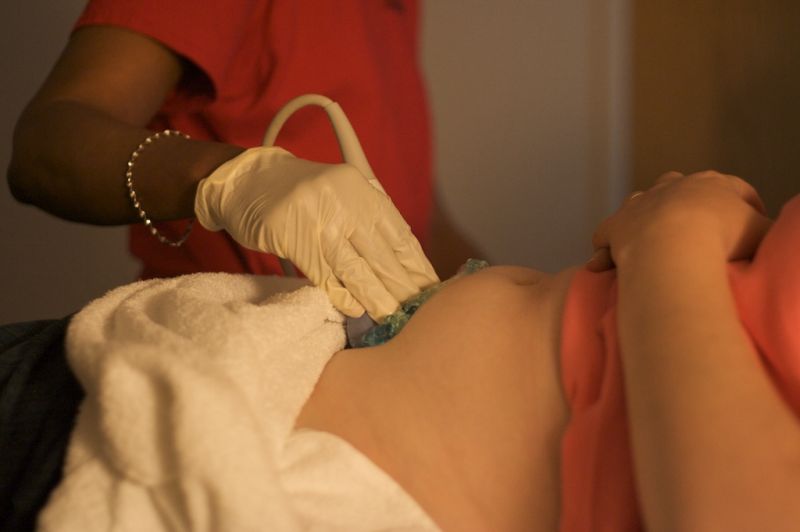
The final version of Virginia's bill allows women to opt for a jelly-on-the-belly ultrasound instead of a transvaginal one.<a href="http://www.flickr.com/photos/scottwilder/2659525509/">Scott Wilder</a>/Flickr
Virginia’s controversial mandatory ultrasound bill is now headed to Gov. Bob McDonnell’s desk. While the final version of the bill allows women to opt out of having an invasive transvaginal ultrasound—the provision that drew a national spotlight in the last couple weeks—don’t be fooled: It’s still a burdensome law.
The original bill would have required women seeking an abortion to undergo whatever kind of ultrasound gets the best image of the embryo or fetus. In the early stages of pregnancy—when the vast majority of abortions occur—that’s typically a transvaginal ultrasound, which is far more invasive than the abdominal kind (think jelly-on-the-belly). That requirement was scrapped at the eleventh hour, after a deluge of national attention. Abortion rights activists said mandating such an invasive procedure amounted to “state-sanctioned rape,” a comparison that clearly struck a nerve: Saturday Night Live and The Daily Show took cracks at the bill; more than a thousand women gathered in silent protest outside the state capitol. Eventually, McDonnell backtracked on his initial support, stating last week, “No person should be directed to undergo an invasive procedure by the state, without their consent, as a precondition to another medical procedure.”
The public outcry against Virginia’s bill appears to have caused other state legislatures in Pennsylvania, Alabama, and Idaho to back down as well—at least when it comes to the transvaginal requirement. It seems Virginia Del. Dave Albo isn’t the only one to discover that “transvaginal” can be a rather radioactive term. But while it’s tempting to view this new aversion to forced vaginal probing as a partial victory, abortion rights advocates are quick to point out that Virginia’s final bill—and others like it—is still terrible. Here are five reasons why:
- It’s medically unnecessary. Although many doctors do perform an ultrasound before an abortion, it’s not considered medically necessary in the first trimester—and requiring them leaves no room for the doctor’s discretion or the patient’s choice. Vicki Saporta of the National Abortion Federation told TPM, “Really the abdominal versus transvaginal ultrasound issue is a distraction, one that has gotten a lot of publicity.” And since abdominal ultrasounds typically can’t even get a good image in the first 12 weeks of pregnancy, Sean Holihan of NARAL Pro-Choice Virginia explains, the new law is essentially “telling women to go and pay for a completely useless procedure.”
- It’s costly. According to the Virginia Pro-Choice Coalition (PDF), an ultrasound can cost anywhere between $200 and $1,200—a hefty price that many insurance companies won’t cover if it’s not medically necessary. Democrats tried unsuccessfully to attach amendments to the Virginia bill requiring insurance companies or the government to pick up the tab if the state mandates it. And while the bill says women must be provided with a list of places that offer free ultrasounds, the Virginia Pro-Choice Coalition points out that many of those facilities are “crisis pregnancy centers” with their own anti-abortion agenda. “Virginia is sending women to places that will do everything in their power, including lying, to convince them not to have an abortion,” Holihan explains.
- It’s a serious burden, especially for women in poor and rural areas. In practical terms, perhaps the most onerous aspect of Virginia’s law is the 24-hour waiting period between the ultrasound and the abortion, which Holihan says is “just putting another barrier in front of women.” Because of this unnecessary delay, women will likely end up taking an extra day off work, skipping another day of school, or spending twice as much on childcare to get the procedure. The law does allow women who live more than 100 miles away from an abortion provider to wait only two hours. But considering that 85 percent of Virginia’s counties lack an abortion care provider, a two-day procedure could be a real obstacle for plenty of women in rural areas throughout the state.
- Women don’t need to be reminded that they’re pregnant. According to their proponents, mandatory ultrasounds are necessary to ensure that women are fully informed about their pregnancies before deciding whether to terminate them. But research suggests ultrasounds don’t have much effect on a woman’s decision to abort. Two soon-to-be released studies from the University of California, San Francisco found that women were unlikely to change their mind about getting an abortion—regardless of what they felt after seeing the ultrasound image. As one of the researchers explained, “Women do not have abortions because they believe the fetus is not a human or because they don’t know the truth.”
- Above all, this is a political move. Supporters of mandatory ultrasound laws tend to argue they’re simply about providing women with “all the information” they need before consenting to an abortion. But it’s also no secret that most—including Rep. Michele Bachman (R-Minn.), who’s introduced such legislation on the federal level—hope that seeing an image of your fetus might discourage you from aborting it. During the final debate over the Virginia bill, supporters acknowledged “that part of the bill’s intent was to make women think twice before undergoing an abortion,” the Richmond Times Dispatch reports. As Del. David L. Englin, who voted against the bill, put it, “In my view, the true nature of this bill is…to use emotional blackmail, practical logistical barriers and just plain old government bullying to try to prevent women from having abortions.”
Once it’s signed by Gov. McDonnell, the bill will make Virginia the eighth state to require doctors to perform an ultrasound before an abortion (PDF). It’s not the first state to consider a bill that effectively mandates a transvaginal ultrasound either. And while such laws have been blocked by the courts in Oklahoma and North Carolina, a new Texas law—which goes even further than Virginia’s by requiring women to be shown the ultrasound monitor and hear a detailed description of the image even if they refuse—recently went into effect.














